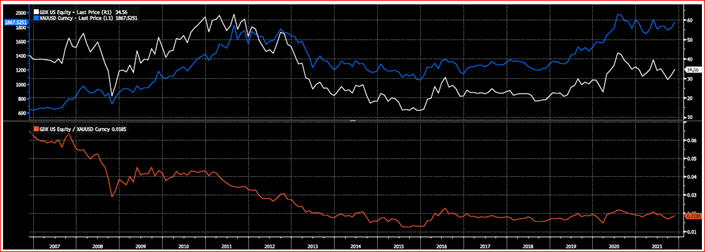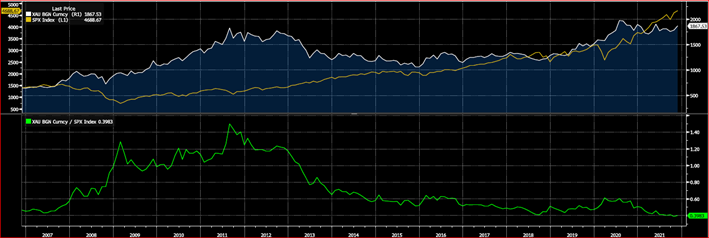Gold bullion and gold mining shares are about as depressed as they ever get in relation to bonds and stocks.
Gold and gold mining equities used to be considered a hedge against inflation and the debasement of paper money.
With the Fed reluctant to take strong measures to fight inflation will gold finally have its day?
According to Paul Wong, of Sprott Asset Management, the sentiment on gold and gold mining shares is extremely negative. The average return for the following 12 months when investors get this negative on gold has been about 20 percent.
Going back to 2016 this degree of negative positioning on gold has happened only about 3 or 4 times.
Gold and gold miners are cheap relative to history and these investments have provided inflation protection in the past, especially in the late 1970s when inflation peaked in 1980 and gold peaked at $850 per ounce.

Source: Bloomberg
In the lower panel we see that the ratio of gold mining stocks to the price of gold is at a low ebb, only slightly higher than the previous low in 2015 but well below the ratio 15 years ago when the stock market peaked prior to the GFC. Gold mining shares, unlike the FAANG stocks, did not really recover after the stock market bottom in 2009.
The gold price itself has done well since the peak of the dot-com bubble in 2000 but has performed less spectacularly since the bottom of the market in 2009.

Source: Bloomberg
The green line in the lower panel shows gold outperforming the S&P 500 until 2011 but since then the S&P has pulled ahead, by a lot. The S&P 500 has more than quadrupled since 2011 while the gold price is up only slightly, from $1500 to about $1900.
But what catalyst could turn investors and speculators more positive on gold?
Trey Reik of Bristol Gold Group LLC wrote a 21-page essay titled “Imbalanced” in August 2021 that covers all the topics related to gold. He points out that “hot” inflation reports can cause investors to sell gold as they believe that the Fed will have to tighten monetary policy and raise interest rates above the rate of inflation, a negative for gold. But will the Fed act quickly and decisively?
Here’s one Fed member, Chicago Fed President Charles Evans:
“We should not preemptively end a strong improvement in the labor market because somebody is getting nervous about inflation”
This quote suggests the Fed will be moving very slowly and carefully. The extraordinary amount of bond purchases will extend until mid-2022. And the first increase in the Fed funds rate is not expected until then.
Reik asks, “Why is the Fed still in crisis mode?”
Why has the Fed expanded its balance sheet from $1 trillion in 2008 to $8 trillion 13 years later?
Was it just incompetence or was it necessary to avoid a financial meltdown?
Would gold ownership be a reliable hedge during a financial crisis?
We might find out soon.
Hilliard MacBeth
The opinions expressed in this report are the opinions of the author and readers should not assume they reflect the opinions or recommendations of Richardson Wealth or its affiliates. Assumptions, opinions and estimates constitute the author's judgment as of the date of this material and are subject to change without notice. We do not warrant the completeness or accuracy of this material, and it should not be relied upon as such. Before acting on any recommendation, you should consider whether it is suitable for your particular circumstances and, if necessary, seek professional advice. Past performance is not indicative of future results. The comments contained herein are general in nature and are not intended to be, nor should be construed to be, legal or tax advice to any particular individual. Accordingly, individuals should consult their own legal or tax advisors for advice with respect to the tax consequences to them, having regard to their own particular circumstances.. Richardson Wealth is a member of Canadian Investor Protection Fund. Richardson Wealth is a trademark by its respective owners used under license by Richardson Wealth.